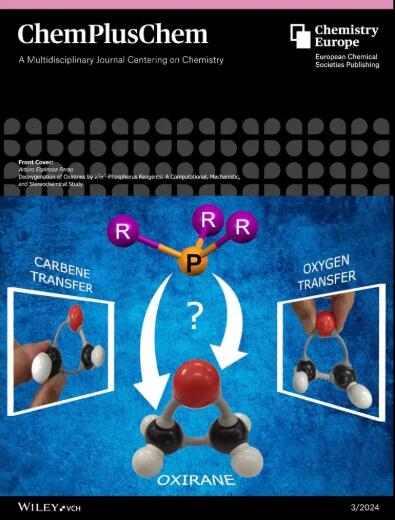Bridge‐dependent donor‐metal‐acceptor‐metal‐donor (D‐M‐A‐M‐D) systems: from charge transfer to electron transfer in dioxolene‐Ge‐diimine complexes.
IF 3
4区 化学
Q2 CHEMISTRY, MULTIDISCIPLINARY
引用次数: 0
Abstract
Synthesis and structural characterization of a family of germanium‐dioxolene complexes with ditopic N‐donor ligands (L1‐L5) (L1 = 1,2‐bis(pyridin‐2‐ylmethylene)hydrazine L2 = 1,6‐bis‐(pyridin‐2‐yl)‐2,5‐diaza‐1,5‐heхаdiene, L3 = N,N‐bis(pyridin‐2‐ylmethylene)‐1,4‐benzenediamine, L4 = N,N‐bis(pyridin‐2‐ylmethylene)‐(biphenyl)‐4,4‐diamine, L5 = 2,2’‐azopyridine) is reported. The reaction of germanium bis‐catecholate with bridging ligands L1 – L4, differing by the nature of the linker between pyridine sites gives rise to dinuclear digermanium complexes (36Cat2Ge)2L1‐4 (36Cat = dianion of 3,6‐di‐tert‐butylcatechol) 1‐4 of DMAMD type (donor‐metal‐acceptor‐metal‐donor) with a charge transfer in the UV‐Vis region. In opposite, the interaction of the 36Cat2Ge with 2,2’‐azopyridine (L5) results in the two‐electron transfer from the donor 36Cat2‐ ligands to the azopyridine bridge forming stable open‐shell complex 5 [(36SQ)(36CatGe)]2(L5)2‐ (36SQ = radical‐anionic semiquinonate ligand). Molecular structures of compounds 3 and 5 were determined by single crystal X‐ray diffraction analysis. Electronic structures of complexes 1‐5 were studied by means of DFT calculations.桥依赖性供体-金属-受体-金属-供体(D-M-A-M-D)系统:二氧戊烯-锗-二亚胺复合物中的电荷转移到电子转移。
锗-二氧戊环配合物家族的合成和结构表征,该家族具有二价 N-供体配体(L1-L5)(L1 = 1,2-双(吡啶-2-基亚甲基)肼,L2 = 1,6-双(吡啶-2-基)-2、L3 = N,N-双(吡啶-2-基亚甲基)-1,4-苯二胺,L4 = N,N-双(吡啶-2-基亚甲基)-(联苯)-4,4-二胺,L5 = 2,2'-氮杂吡啶)。双邻苯二酚锗与桥接配体 L1 - L4 反应(吡啶位点之间的连接物性质不同),产生了双核二锗配合物 (36Cat2Ge)2L1-4 (36Cat = 3,6-二叔丁基邻苯二酚的二元离子)1-4,该配合物属于 DMAMD 类型(供体-金属-受体-金属-供体),在紫外可见光区发生电荷转移。与此相反,36Cat2Ge 与 2,2'-氮杂吡啶(L5)相互作用,导致两个电子从供体 36Cat2- 配体转移到氮杂吡啶桥上,形成稳定的开壳配合物 5 [(36SQ)(36CatGe)]2(L5)2-(36SQ = 自由基阴离子半醌酸配体)。化合物 3 和 5 的分子结构是通过单晶 X 射线衍射分析确定的。通过 DFT 计算研究了复合物 1-5 的电子结构。
本文章由计算机程序翻译,如有差异,请以英文原文为准。
求助全文
约1分钟内获得全文
求助全文
来源期刊

ChemPlusChem
CHEMISTRY, MULTIDISCIPLINARY-
CiteScore
5.90
自引率
0.00%
发文量
200
审稿时长
1 months
期刊介绍:
ChemPlusChem is a peer-reviewed, general chemistry journal that brings readers the very best in multidisciplinary research centering on chemistry. It is published on behalf of Chemistry Europe, an association of 16 European chemical societies.
Fully comprehensive in its scope, ChemPlusChem publishes articles covering new results from at least two different aspects (subfields) of chemistry or one of chemistry and one of another scientific discipline (one chemistry topic plus another one, hence the title ChemPlusChem). All suitable submissions undergo balanced peer review by experts in the field to ensure the highest quality, originality, relevance, significance, and validity.
 求助内容:
求助内容: 应助结果提醒方式:
应助结果提醒方式:


